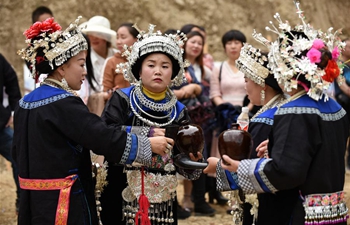JERUSALEM, April 8 (Xinhua) -- Israelis will cast their ballots on Tuesday in parliamentary elections that could see Prime Minister Benjamin Netanyahu securing a fifth term, despite corruption allegations, or Benny Gantz, ex-chief of forces and a political newcomer, overthrowing the long-serving prime minister.
Here are questions and answers to the elections and key issues to watch.
What will happen?
Israel's 6.34 million eligible voters have to cast their votes in ballots throughout the country in the morning. Final results are expected on early Wednesday.
What are Israelis voting for?
Israelis vote for parties, not for the prime minister or lawmakers.
Who are the main contenders?
Likud
The Likud, Israel's main right-wing party, has been in power since 2009.
The party has been led by Netanyahu continuously since 1993, except for six years under the leadership of the late Prime Minister Ariel Sharon.
It expresses hardline stances regarding Iran's nuclear program and the Palestinians, with Netanyahu vowing to annex settlements in the occupied West Bank, should he be re-elected.
Netanyahu is fighting for a fifth term in office, although he is accused of being involved in three separate criminal corruption cases and could potentially face trial.
Blue and White
The party was formed on Feb. 21 and quickly emerged as the toughest challenger to Netanyahu's rule.
It is led by Benny Gantz, 59, Israel's former chief of forces who led the 2014 military campaign in the Gaza Strip.
The centrist party was formed as an alliance with Yair Lapid's Yesh Atid and two additional ex-chiefs of forces. Gantz and Lapid have agreed to rotate the premiership between them, should they win, with Gantz serving first as prime minister.
In his campaign, Gantz uses "unifying" rhetoric, calling for healing rifts in the deeply divided Israeli society. His campaign also speaks against the corruption of Netanyahu's government.
Blue and White's platform calls for "disengagement" from the Palestinians but stops short of supporting a Palestinian state alongside Israel.
Who is expected to win?
Netanyahu said on Monday that Gantz "is leading" and the right-wing rule "is in danger," seeking to alarm Likud supporters and mobilize them to the ballots.
However, recent opinion polls show a tight race, with Gantz's Blue and White receiving about 30 seats and Netanyahu's Likud slightly lagging behinds with about 28 seats.
Even if Blue and White gains more votes than the Likud, Gantz is not certain to form the next government unless he forms a coalition with other parties. According to the polls, the right-wing bloc is predicted to gain some 65 seats, far more than the 55 seats predicted to the left-centrist bloc.
A governing coalition needs at least 61 seats in the 120-seat parliament. No single Israeli party has ever won enough seats to form a government, and all governments have been coalitions of several parties. So if the polls will prove right, Netanyahu has a good chance to form the next government.
What coalitions could be formed?
Netanyahu has already said he will seek a coalition similar to his current government, with ultra-nationalist and ultra-Orthodox parties. Gantz could form a narrow coalition with the left-wing and centrist parties. Gantz said he will not sit in a coalition with Arab parties but only with Zionist parties.
Commentators have been speculating of a Blue and White-Likud unity government, although Gantz has vowed not to sit in a coalition with Netanyahu because the latter has been tainted with criminal allegations over bribery, fraud, and breach of trust cases.
What unexpected factors could influence the results?
Moshe Feiglin, an ultra-nationalist politician, has been drawing unexpectedly strong support with his libertarian Zehut party, which calls for legalization of marijuana and free markets.
With polls predicting him five to seven seats, he could emerge as a kingmaker in potential coalition talks.
Feiglin said he has no preference between Netanyahu and Gantz as prime minister.
















